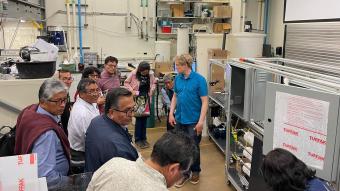Colorado School of Mines, UNSA announce third phase of sustainable mining research partnership

Researchers from UNSA and Mines review the operation of a cyanide removal system that they developed and built to improve the quality of wastewater from mining operations.
Colorado School of Mines and Universidad Nacional de San Agustín de Arequipa (UNSA) in Peru are pleased to announce a third phase of collaborative research on sustainable mining.
The new research projects funded through the Center for Mining Sustainability will tackle topics ranging from rare earth minerals and sustainable aquifer management, to nature-based water treatment and the reuse and repurposing of mine tailings.
Established in 2019, the Center for Mining Sustainability is a joint initiative of Mines and UNSA, bringing together researchers from both institutions to apply data-driven, interdisciplinary science, technology and innovation to help chart a new course toward a sustainable future, with the aim of becoming an international benchmark for research in sustainable mining.
Previous phases of research funded by the center have seen 17 projects completed on water supply and contamination reduction, reuse and reprocessing of mining waste materials, and identification and management of geologic hazards in small mining communities, among others. More than 40 Mines researchers and 30 UNSA researchers have been involved since the center’s founding.
“As the world’s top university for minerals and mining engineering, Colorado School of Mines has a unique global role in advancing research partnerships for sustainability and innovation,” said Walter Copan, Vice President for Research and Technology Transfer at Mines. “The highly productive collaboration with UNSA and stakeholders across Peru contributes effectively to the future of workforce leadership, to the development and deployment of sustainable solutions, and to building and maintaining trusted supply chain partnerships.”
“Mines is excited to continue our incredibly productive collaboration with UNSA,” said Paul Santi, director of the center and professor of geology and geological engineering. “Over the years we have seen the positive benefits of our work on the local communities, reducing environmental impacts and developing new tools for them to manage their resources. This new phase of research moves us even further into the implementation and application of research.”
The third phase of research will include $4.2 million in funding for four new projects, bringing the total research funding provided by UNSA through the center since 2019 to over $19 million. UNSA’s funding for the projects comes from Peru’s Canon Minero, or Mining Royalty fund, which receives a percentage of taxes paid by local mining companies.
The first new Mines-UNSA project, directed by John McCray, professor of civil and environmental engineering at Mines, will develop a rigorous publicly available groundwater model for the sustainable management of regional or major aquifers of the Arequipa Region. The model will integrate surface water infiltration and runoff information developed in previous research so researchers can evaluate the current and future sustainability of the aquifers under different projected changes in climate, industrial/agricultural uses and domestic water uses. The work will also produce a database of groundwater quality information and a fundamental statistical summary of water quality parameters.
The second project, directed by Reza Hedayat, associate professor of civil and environmental engineering at Mines, will develop a pilot plant to produce geopolymer concrete and bricks from mine tailings. Previous research at the laboratory scale optimized the chemical production process for reusing mine tailing waste, demonstrating the viability of creating different types of construction materials. Each tailings source has unique chemistry and geomechanical properties, so the process is tailored to both the material and the potential construction product.
The third project, directed by Josh Sharp, professor and associate department head of civil and environmental engineering at Mines, will develop a sustainable, nature-based treatment system called a unit process open water (UPOW) wetland. Relying on colonized microorganisms, the design will be more adaptable and scalable than plant-based wetlands. The UPOW system will also treat highly variable river water for irrigation applications, instead of industrial water sources that have more well established and consistent chemistry.
The fourth project, directed by Rod Eggert, research professor of economics and business at Mines, will identify and characterize deposits of rare earth minerals in Southern Peru. Rare earth minerals are classified as “critical” because of their strategic importance for numerous industrial, technological and defense applications, and for concerns about the security of their supply. The project will identify target locations for detailed analysis, collect samples to characterize these deposits, and complete economic, environmental and market analyses to prepare for future development of these resources.
For more information about the Center for Mining Sustainability, go to miningsustainability.mines.edu.
About UNSA
Universidad Nacional de San Agustín de Arequipa was founded in 1828 as a public university in Arequipa, Peru. Its mission is to train high-quality professionals to be competitive, capable of being agents of change and development in society, and excellent researchers capable of solving the problems that impact the environment of the region and Peru. For more information, go to www.unsa.edu.pe.
About Mines
Colorado School of Mines is a public R1 research university focused on applied science and engineering, producing the talent, knowledge and innovations to serve industry and benefit society – all to create a more prosperous future. Learn more at mines.edu.




